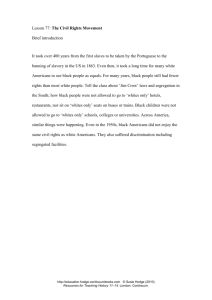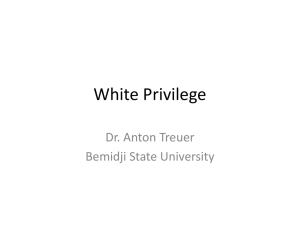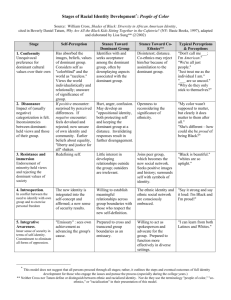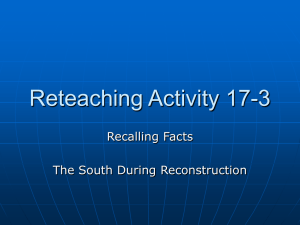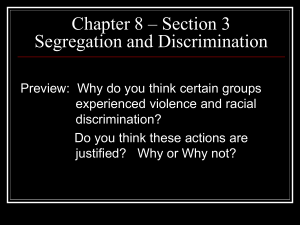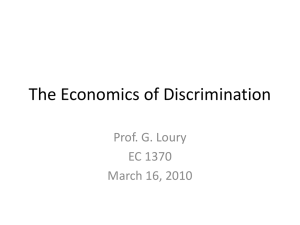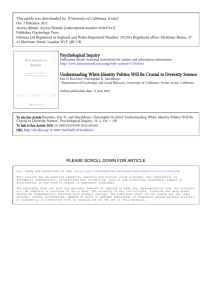Explaining White Privilege by Tim Wise.doc
advertisement
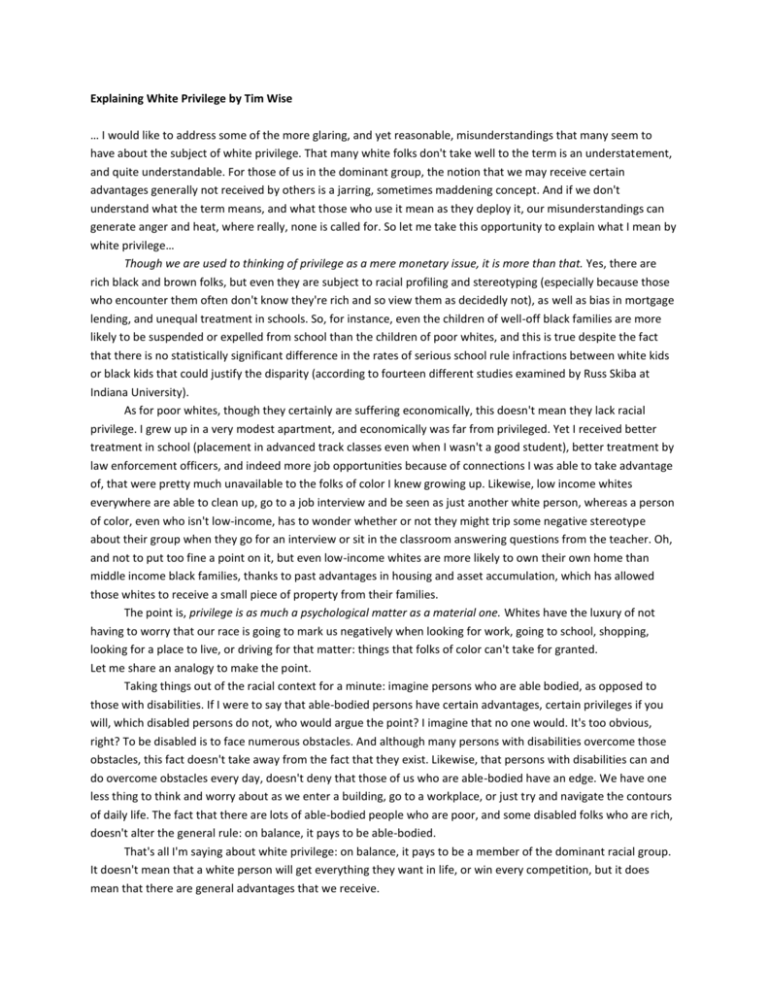
Explaining White Privilege by Tim Wise … I would like to address some of the more glaring, and yet reasonable, misunderstandings that many seem to have about the subject of white privilege. That many white folks don't take well to the term is an understatement, and quite understandable. For those of us in the dominant group, the notion that we may receive certain advantages generally not received by others is a jarring, sometimes maddening concept. And if we don't understand what the term means, and what those who use it mean as they deploy it, our misunderstandings can generate anger and heat, where really, none is called for. So let me take this opportunity to explain what I mean by white privilege… Though we are used to thinking of privilege as a mere monetary issue, it is more than that. Yes, there are rich black and brown folks, but even they are subject to racial profiling and stereotyping (especially because those who encounter them often don't know they're rich and so view them as decidedly not), as well as bias in mortgage lending, and unequal treatment in schools. So, for instance, even the children of well-off black families are more likely to be suspended or expelled from school than the children of poor whites, and this is true despite the fact that there is no statistically significant difference in the rates of serious school rule infractions between white kids or black kids that could justify the disparity (according to fourteen different studies examined by Russ Skiba at Indiana University). As for poor whites, though they certainly are suffering economically, this doesn't mean they lack racial privilege. I grew up in a very modest apartment, and economically was far from privileged. Yet I received better treatment in school (placement in advanced track classes even when I wasn't a good student), better treatment by law enforcement officers, and indeed more job opportunities because of connections I was able to take advantage of, that were pretty much unavailable to the folks of color I knew growing up. Likewise, low income whites everywhere are able to clean up, go to a job interview and be seen as just another white person, whereas a person of color, even who isn't low-income, has to wonder whether or not they might trip some negative stereotype about their group when they go for an interview or sit in the classroom answering questions from the teacher. Oh, and not to put too fine a point on it, but even low-income whites are more likely to own their own home than middle income black families, thanks to past advantages in housing and asset accumulation, which has allowed those whites to receive a small piece of property from their families. The point is, privilege is as much a psychological matter as a material one. Whites have the luxury of not having to worry that our race is going to mark us negatively when looking for work, going to school, shopping, looking for a place to live, or driving for that matter: things that folks of color can't take for granted. Let me share an analogy to make the point. Taking things out of the racial context for a minute: imagine persons who are able bodied, as opposed to those with disabilities. If I were to say that able-bodied persons have certain advantages, certain privileges if you will, which disabled persons do not, who would argue the point? I imagine that no one would. It's too obvious, right? To be disabled is to face numerous obstacles. And although many persons with disabilities overcome those obstacles, this fact doesn't take away from the fact that they exist. Likewise, that persons with disabilities can and do overcome obstacles every day, doesn't deny that those of us who are able-bodied have an edge. We have one less thing to think and worry about as we enter a building, go to a workplace, or just try and navigate the contours of daily life. The fact that there are lots of able-bodied people who are poor, and some disabled folks who are rich, doesn't alter the general rule: on balance, it pays to be able-bodied. That's all I'm saying about white privilege: on balance, it pays to be a member of the dominant racial group. It doesn't mean that a white person will get everything they want in life, or win every competition, but it does mean that there are general advantages that we receive. So, for instance, studies have found that job applicants with white sounding names are 50% more likely to receive a call-back for a job interview than applicants with black-sounding names, even when all job-related qualifications and credentials are the same. Other studies have found that white men with a criminal record are more likely to get a call-back for an interview than black male job applicants who don't have one, even when all requisite qualifications, demeanor and communication styles are the same. Others have found that white women are far more likely than black women to be hired for work through temporary agencies, even when the black women have more experience and are more qualified. Evidence from housing markets has found that there are about two million cases of race-based discrimination against people of color every year in the United States. That's not just bad for folks of color; the flipside is that there are, as a result, millions more places I can live as a white person. Or consider criminal justice. Although data from the Substance Abuse and Mental Health Services Administration indicates that whites are equally or more likely than blacks or Latinos to use drugs, it is people of color (blacks and Latinos mostly) who comprise about 90 percent of the persons incarcerated for a drug possession offense. Despite the fact that white men are more likely to be caught with drugs in our car (on those occasions when we are searched), black men remain about four times more likely than white men to be searched in the first place, according to Justice Department findings. That's privilege for the dominant group. That's the point: privilege is the flipside of discrimination. If people of color face discrimination, in housing, employment and elsewhere, then the rest of us are receiving a de facto subsidy, a privilege, an advantage in those realms of daily life. There can be no down without an up, in other words. None of this means that white folks don't face challenges. Of course we do, and some of them (based on class, gender, sexual orientation, disability status, or other factors) are systemic and institutionalized. But on balance, we can take for granted that we will receive a leg-up on those persons of color with whom we share a nation. And no, affirmative action doesn't change any of this. …Even with affirmative action in place (which, contrary to popular belief does not allow quotas or formal set-asides except in those rare cases where blatant discrimination has been proven) whites hold about ninety percent of all the management level jobs in this country, receive about ninety-four percent of government contract dollars, and hold ninety percent of tenured faculty positions on college campuses. And in spite of affirmative action programs, whites are more likely than members of any other racial group to be admitted to their college of first choice.* And according to a study released last year, for every student of color who received even the slightest consideration from an affirmative action program in college, there are two whites who failed to meet normal qualification requirements at the same school, but who got in anyway because of parental influence, alumni status or because other favors were done… In other words, despite the notion that somehow we have attained an equal opportunity, or color-blind society, the fact is, we are far from an equitable nation. People of color continue to face obstacles based solely on color, and whites continue to reap benefits from the same. None of this makes whites bad people, and none of it means we should feel guilty or beat ourselves up. But it does mean we need to figure out how we're going to be accountable for our unearned advantages. One way is by fighting for a society in which those privileges will no longer exist, and in which we will be able to stand on our own two feet, without the artificial crutch of racial advantage to prop us up. We need to commit to fighting for racial equity and challenging injustice at every turn, not only because it harms others, but because it diminishes us as well (even as it pays dividends), and because it squanders the promise of fairness and equity to which we claim to adhere as Americans. It's about responsibility, not guilt. And if one can't see the difference between those two things, there is little that this or any other article can probably do. Perhaps starting with a dictionary would be better.
